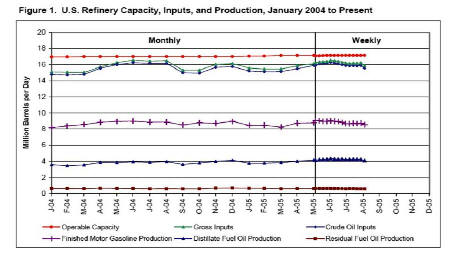
Chart made available from AAA's website and are updated daily.
The new cost of commuting
By Maggie Rhynes and JJ Ossola
IV Leader Staff
If you ask Illinois Valley Community College students why they chose to attend
IVCC, the phase "it's cheaper" will appear on many lists.
However, as gas prices reach new highs with no signs of significantly lower
prices anywhere in the future, IVCC students aren't saving as much money as they
used to.
According to the Energy Information Agency's (part of the federal government)
statistics, Midwest gas prices a year ago were $1.80 a gallon, prices now
average $2.89, which adds up to bigger spending for commuter students.
First-year IVCC nursing student Julia Korba says the cost of driving to IVCC and
doing general driving is adding up.
"As a full-time student, it's really stressing my budget." Korba said. "I have
to limit the times I drive here, which means long hours for me here."
Korba uses the many resources at IVCC, including the nursing computer lab to
keep up with school work.
"What's really putting the squeeze on me is Route 71 being closed, I have to
take Route 6 (from Ottawa) so it takes more time and more gas." Korba added.
Korba is one of many students who have had to adjust their school routines to
save on gas. Sarah Schabow an elementary education student from Princeton has
also altered her habits. "I have day and evening classes on Monday's and
Wednesday's. Now I don't go home in between, I just stay here and wait." Schabow
explained as she lounged in a couch in the hallway, midway between her 2-hour
wait.
While students do what they can to keep their costs down, it doesn't seem like
gas stations will be lowering prices any time soon. Even prior to the price
hikes caused by Hurricane Katrina, EIA was forecasting that the average retail
price would remain above $2 per gallon through all of 2006.
Hurricane Katrina, while causing much more devastating effects in lives of Gulf
Coast residents, didn't do much to help IVCC students commuting costs. The EIA
states retail gasoline prices are likely to remain very high for some time to
come, with as much as 5 percent of refinery capacity possibly being out of
commission for a few months.
In addition, while crude oil production from the Gulf of Mexico continues to
improve, it may be some time before production is back to pre-hurricane levels.
Geology instructor Mike Phillips says he isn't surprised to hear that, "From a
Geologists point of view, we would expect them to continue to go up over the
next few years."
Phillips, like many IVCC instructors has also made life-style alterations to
save on gas. "I own a flexible fuel vehicle that burns E85 gasoline (85 percent
ethanol from corn). It helps save money and my wife and I are making fewer
trips." Phillips said.
Other students at IVCC are using other methods to save on gas, such as car
pooling.
Carlie Newton, an IVCC student from Streator is thankful for the change to
carpool. "I'm lucky to be carpooling, if I wasn't, I couldn't imagine how often
I would be buying gas," she said. "I can't remember the last time my tank was
full."
Newton shares her trip with three other people three days a week.
Other students commuting to IVCC from towns outside of La Salle and Oglesby are
making sure they check out the area prices.
"I drive here from south of Streator," Zac Medema an IVCC student said. "When
the prices at home get to high, I try to fill up in Oglesby or La Salle, where
ever is the cheapest."
One way for students to keep up on the ever-changing gas prices to log on to
websites like www.gasbuddy.com, which posts gas prices from area gas stations.
An Oglesby area search provided gas prices within 25 miles of Oglesby. The
prices were organized into two lists, highest reported prices and lowest.
Unfortunately, this particular search showed La Salle and Oglesby on the
"highest prices list."
However, with gas prices fluctuating regularly, checking websites like this one
before you fill up just might save you a few bucks.
The EIA reported at press time that gasoline imports from Europe should be
arriving soon to lower gas prices, at least temporarily, as the Gulf Coast
recovers.
Meanwhile, IVCC students are stuck paying big bucks at the pump. Perhaps some
day, gas prices will be figured into financial aid. Until then, its high prices
and carpools.

Chart made available from AAA's website and are updated daily.

Charts like this one can be found on the EIA website and help consumers to
understand how and why fuel prices fluctuate. Eia also posts current and
historical fuel prices, gasoline, diesel, heating fuels, and other types.